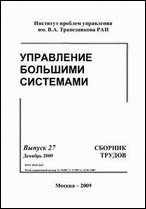|
This article is cited in 1 scientific paper (total in 1 paper)
Control in Technology and Process Control
Models of designing and learning a technology of complex activity
M. V. Belova, D. A. Novikovb
a IBS Group Holding Limited
b V.A. Trapeznikov Institute of Control Sciences of Russian Academy of Sciences, Moscow
Abstract:
Presented mathematical models are based on previous studies of the problems of managing organizational and technical systems and their complex activities, executed by the authors. The problem of developing and / or mastering the technology of complex activity is formalized in the form of a mathematical model, which generalizes of probabilistic learning models. The properties of the process of developing and / or mastering technology (learning) are studied, the convergence of the process to the state of full technology mastering is shown, analytical expressions of the characteristics of the models are obtained - the average time to reach a given level of mastering. The models of learning that describe the integration of elements of technology - conjunctive, disjunctive and parallel development of technology are proposed. Developed and studied models of learning in the process of work and group learning. including the “learning to learn” model - when the intensity of the learning process depends on the learning level achieved. For all models of integration, analytical expressions for learning levels are obtained. The asymptotic case of models during the transition to continuous time is investigated. It is shown that special cases of the proposed model are models of exponential, hyperbolic, and logistic learning curves, which are widespread in the theory of learning, theory of system testing, software testing, and related branches of knowledge.
Keywords:
technology, complex activity, learning curve.
Received: July 10, 2018
Published: January 31, 2019
Citation:
M. V. Belov, D. A. Novikov, “Models of designing and learning a technology of complex activity”, UBS, 77 (2019), 171–218
Linking options:
https://www.mathnet.ru/eng/ubs988 https://www.mathnet.ru/eng/ubs/v77/p171
|

| Statistics & downloads: |
| Abstract page: | 191 | | Full-text PDF : | 60 | | References: | 27 |
|




 Contact us:
Contact us: Terms of Use
Terms of Use
 Registration to the website
Registration to the website Logotypes
Logotypes








 Citation in format
Citation in format 
